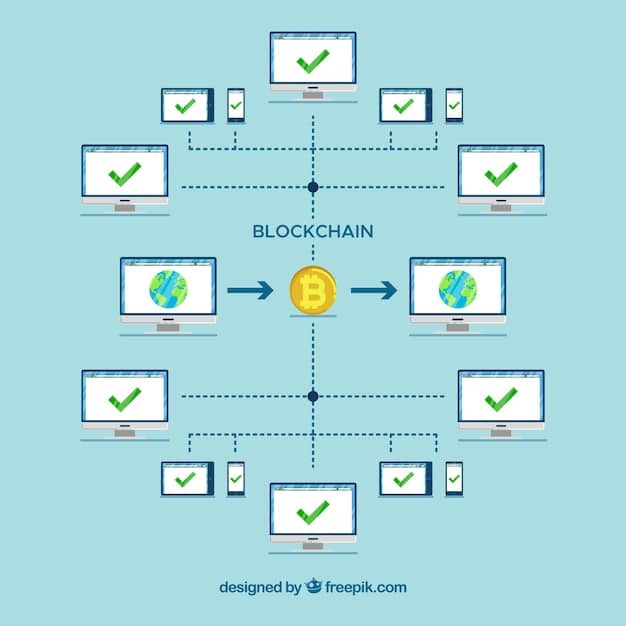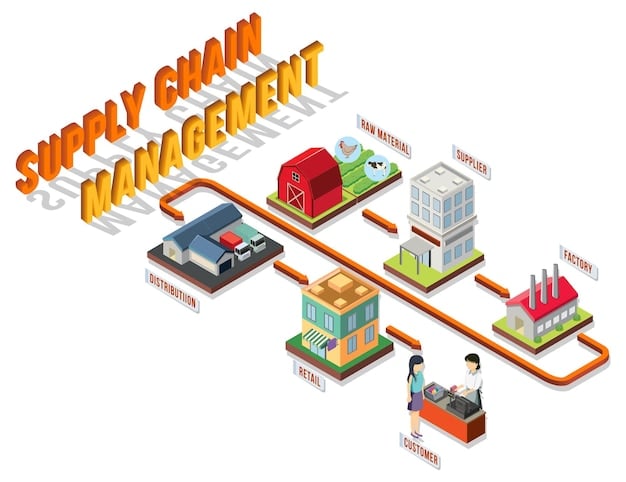How Blockchain Technology is Revolutionizing US Supply Chains

How Blockchain Technology is Transforming Supply Chain Management in the US by enhancing transparency, security, and efficiency across various industries, leading to streamlined operations and reduced costs.
The US supply chain is undergoing a massive transformation, and at the forefront of this revolution is how blockchain technology is transforming supply chain management in the US. The integration of blockchain promises unprecedented levels of transparency, security, and efficiency, addressing many long-standing challenges in the industry.
But how exactly is this technology being implemented, and what are the practical benefits for businesses and consumers alike? This article dives deep into the ways blockchain is reshaping supply chains across the United States.
How Blockchain Technology is Transforming Supply Chain Management in the US
The impact of how blockchain technology is transforming supply chain management in the US is far-reaching. From tracking goods in real-time to verifying the authenticity of products, blockchain is providing solutions that were previously unattainable. This is not just about improving efficiency; it’s about building trust and resilience into the very fabric of the US supply chain.
Enhanced Transparency and Traceability
One of the most significant advantages of blockchain is its ability to provide end-to-end visibility. Every transaction, every movement of goods, can be recorded on the blockchain, creating an immutable and transparent record.
< ul>
Blockchain also supports better collaboration among supply chain participants by providing a single, shared version of the truth.

Increased Security and Reduced Fraud
Security is a paramount concern in supply chain management. Blockchain’s inherent security features make it an ideal solution for protecting sensitive data and preventing fraud.
- Immutable records: Once data is recorded on the blockchain, it cannot be altered or deleted, ensuring data integrity.
- Decentralized network: The decentralized nature of blockchain makes it resistant to hacking and single points of failure.
- Smart contracts: Automated contracts ensure that agreements are executed fairly and transparently.
How blockchain technology is transforming supply chain management in the US by ensuring that all participants in the supply chain have access to secure and reliable data.
The implementation of blockchain solutions can assist in the reduction of supply chain disruptions and risks.
The Key Benefits of Blockchain in Supply Chain Management
The advantages of using blockchain in supply chain management are substantial, impacting businesses across various sectors. From cost savings to improved efficiency, the benefits are clear and compelling.
- Cost Reduction: By automating processes and reducing the need for intermediaries, blockchain can significantly lower operational costs.
- Faster Transactions: Blockchain enables faster and more efficient transactions, reducing lead times and improving customer satisfaction.
- Enhanced Collaboration: All supply chain participants have access to the same information, fostering trust and collaboration.
Blockchain enhances supply chain resilience, providing businesses with the tools they need to adapt to changing market conditions and maintain a competitive edge.

Real-World Applications of Blockchain in US Supply Chains
The practical applications of blockchain in US supply chains are diverse and growing. Several industries are already leveraging this technology to improve their operations.
Food and Agriculture
In the food industry, blockchain provides a way to track food products from farm to table, ensuring food safety and transparency.
Pharmaceuticals
Pharmaceutical companies are using blockchain to combat counterfeit drugs and ensure the integrity of their supply chains. How blockchain technology is transforming supply chain management in the US by validating the authenticity and safety of pharmaceuticals products.
Retail
Retailers are employing blockchain to enhance inventory management and improve the customer experience. Using blockchain, retailers can confirm supply chain authenticity and create brand name value.
By providing greater visibility and accountability, blockchain is helping these industries build stronger and more resilient supply chains.
Overcoming the Challenges of Blockchain Implementation
While the potential of blockchain is immense, there are challenges to overcome before widespread adoption can occur. Understanding these challenges is crucial for successful implementation.
Scalability
Scalability is a major concern for blockchain networks. As more transactions are added to the chain, the network can become slow and congested.
Interoperability
Different blockchain platforms may not be compatible with each other, making it difficult to integrate with existing systems.
Regulatory Uncertainty
The regulatory landscape for blockchain is still evolving, creating uncertainty for businesses. How blockchain technology is transforming supply chain management in the US, the regulatory frame work has to be clear and concise.
Addressing these challenges requires collaboration between businesses, technology providers, and regulators.
The Future of Blockchain in US Supply Chains
Looking ahead, the future of blockchain in US supply chains is bright. As the technology matures and adoption increases, we can expect to see even greater transformation.
- Increased Automation: Blockchain will enable greater automation of supply chain processes, reducing the need for manual intervention.
- Improved Data Analytics: The data stored on the blockchain can be used to gain valuable insights into supply chain performance.
- Greater Sustainability: Blockchain can help companies track and reduce their environmental impact.
How blockchain technology is transforming supply chain management in the US ensures that businesses can optimize their supply chains, reduce costs, and improve sustainability.
| Key Point | Brief Description |
|---|---|
| 🔒 Enhanced Security | Blockchain’s immutability reduces fraud. |
| 🚀 Increased Efficiency | Automation streamlines supply chain processes. |
| 📊 Data Transparency | Real-time tracking builds trust and compliance. |
Frequently Asked Questions
Blockchain is a decentralized, immutable ledger that records transactions across many computers. It ensures transparency and security by design.
By recording every transaction on a shared ledger, blockchain provides end-to-end visibility, allowing all participants to track goods in real-time.
Benefits include reduced costs, faster transactions, enhanced security, and improved collaboration among supply chain participants.
Industries such as food and agriculture, pharmaceuticals, and retail are leveraging blockchain to improve their supply chain operations.
Challenges include scalability issues, interoperability problems, and regulatory uncertainty, all critical factors in how blockchain technology is transforming supply chain management in the US.
Conclusion
In conclusion, how blockchain technology is transforming supply chain management in the US by offering unparalleled opportunities for increased transparency, security, and efficiency, which are essential in today’s global economy. While challenges remain, the potential benefits are too significant to ignore.
As blockchain technology continues to evolve, its adoption in US supply chains will drive innovation, improve sustainability, and create a more resilient and trustworthy supply chain ecosystem for all stakeholders.





